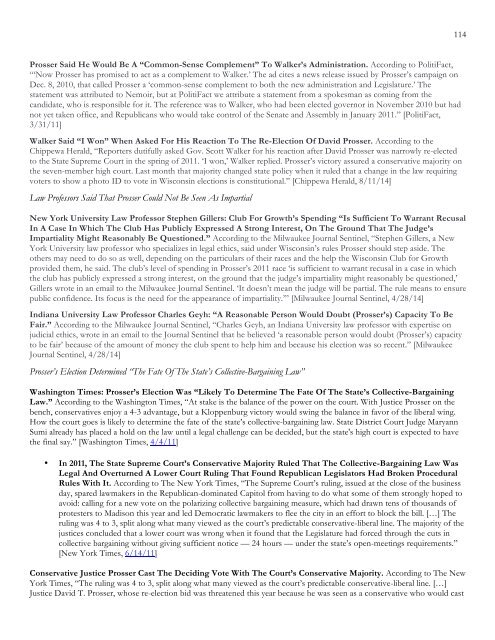Wisconsin-Report
Wisconsin-Report
Wisconsin-Report
You also want an ePaper? Increase the reach of your titles
YUMPU automatically turns print PDFs into web optimized ePapers that Google loves.
114<br />
Prosser Said He Would Be A “Common-Sense Complement” To Walker’s Administration. According to PolitiFact,<br />
“‘Now Prosser has promised to act as a complement to Walker.’ The ad cites a news release issued by Prosser’s campaign on<br />
Dec. 8, 2010, that called Prosser a ‘common-sense complement to both the new administration and Legislature.’ The<br />
statement was attributed to Nemoir, but at PolitiFact we attribute a statement from a spokesman as coming from the<br />
candidate, who is responsible for it. The reference was to Walker, who had been elected governor in November 2010 but had<br />
not yet taken office, and Republicans who would take control of the Senate and Assembly in January 2011.” [PolitiFact,<br />
3/31/11]<br />
Walker Said “I Won” When Asked For His Reaction To The Re-Election Of David Prosser. According to the<br />
Chippewa Herald, “<strong>Report</strong>ers dutifully asked Gov. Scott Walker for his reaction after David Prosser was narrowly re-elected<br />
to the State Supreme Court in the spring of 2011. ‘I won,’ Walker replied. Prosser’s victory assured a conservative majority on<br />
the seven-member high court. Last month that majority changed state policy when it ruled that a change in the law requiring<br />
voters to show a photo ID to vote in <strong>Wisconsin</strong> elections is constitutional.” [Chippewa Herald, 8/11/14]<br />
Law Professors Said That Prosser Could Not Be Seen As Impartial<br />
New York University Law Professor Stephen Gillers: Club For Growth’s Spending “Is Sufficient To Warrant Recusal<br />
In A Case In Which The Club Has Publicly Expressed A Strong Interest, On The Ground That The Judge’s<br />
Impartiality Might Reasonably Be Questioned.” According to the Milwaukee Journal Sentinel, “Stephen Gillers, a New<br />
York University law professor who specializes in legal ethics, said under <strong>Wisconsin</strong>’s rules Prosser should step aside. The<br />
others may need to do so as well, depending on the particulars of their races and the help the <strong>Wisconsin</strong> Club for Growth<br />
provided them, he said. The club’s level of spending in Prosser’s 2011 race ‘is sufficient to warrant recusal in a case in which<br />
the club has publicly expressed a strong interest, on the ground that the judge’s impartiality might reasonably be questioned,’<br />
Gillers wrote in an email to the Milwaukee Journal Sentinel. ‘It doesn’t mean the judge will be partial. The rule means to ensure<br />
public confidence. Its focus is the need for the appearance of impartiality.’” [Milwaukee Journal Sentinel, 4/28/14]<br />
Indiana University Law Professor Charles Geyh: “A Reasonable Person Would Doubt (Prosser’s) Capacity To Be<br />
Fair.” According to the Milwaukee Journal Sentinel, “Charles Geyh, an Indiana University law professor with expertise on<br />
judicial ethics, wrote in an email to the Journal Sentinel that he believed ‘a reasonable person would doubt (Prosser’s) capacity<br />
to be fair’ because of the amount of money the club spent to help him and because his election was so recent.” [Milwaukee<br />
Journal Sentinel, 4/28/14]<br />
Prosser’s Election Determined “The Fate Of The State’s Collective-Bargaining Law”<br />
Washington Times: Prosser’s Election Was “Likely To Determine The Fate Of The State’s Collective-Bargaining<br />
Law.” According to the Washington Times, “At stake is the balance of the power on the court. With Justice Prosser on the<br />
bench, conservatives enjoy a 4-3 advantage, but a Kloppenburg victory would swing the balance in favor of the liberal wing.<br />
How the court goes is likely to determine the fate of the state’s collective-bargaining law. State District Court Judge Maryann<br />
Sumi already has placed a hold on the law until a legal challenge can be decided, but the state's high court is expected to have<br />
the final say.” [Washington Times, 4/4/11]<br />
• In 2011, The State Supreme Court’s Conservative Majority Ruled That The Collective-Bargaining Law Was<br />
Legal And Overturned A Lower Court Ruling That Found Republican Legislators Had Broken Procedural<br />
Rules With It. According to The New York Times, “The Supreme Court’s ruling, issued at the close of the business<br />
day, spared lawmakers in the Republican-dominated Capitol from having to do what some of them strongly hoped to<br />
avoid: calling for a new vote on the polarizing collective bargaining measure, which had drawn tens of thousands of<br />
protesters to Madison this year and led Democratic lawmakers to flee the city in an effort to block the bill. […] The<br />
ruling was 4 to 3, split along what many viewed as the court’s predictable conservative-liberal line. The majority of the<br />
justices concluded that a lower court was wrong when it found that the Legislature had forced through the cuts in<br />
collective bargaining without giving sufficient notice — 24 hours — under the state’s open-meetings requirements.”<br />
[New York Times, 6/14/11]<br />
Conservative Justice Prosser Cast The Deciding Vote With The Court’s Conservative Majority. According to The New<br />
York Times, “The ruling was 4 to 3, split along what many viewed as the court’s predictable conservative-liberal line. […]<br />
Justice David T. Prosser, whose re-election bid was threatened this year because he was seen as a conservative who would cast


